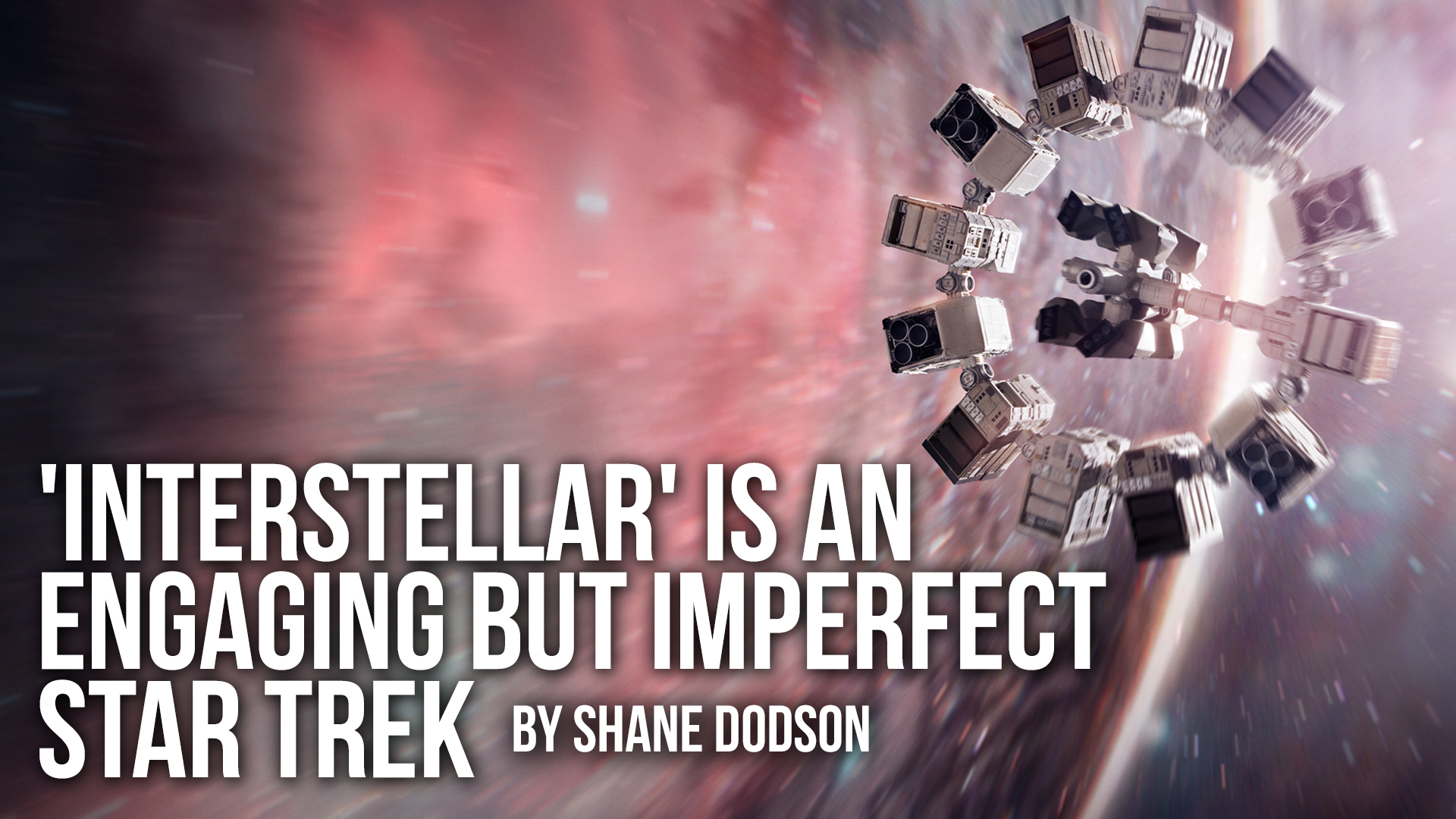There’s space opera, there’s fantasy, and then there’s science fiction.
Interstellar definitely falls into the latter category. The film involves huge sequences involving spaceships, wormholes, alien planets, and hair-breath escapes’but everything is kept grounded in something resembling reality. The setting is in the future, but everything looks pretty much familiar. There’s public schools. There’s corn fields. There’s pick-up trucks. What there isn’t, however, is a standing military force. It seems that all of the nation’s resources are being poured into staying alive. A global anomaly is wreaking havoc on Earth’s atmosphere and steadily killing the planet. The predictions are in: the next generation will be Earth’s last. Fortunately, a wormhole is discovered right next to Saturn. The assumption is that friendly aliens somehow placed it there. Probes sent into the wormhole indicate inhabitable planets on the other side. NASA’now a secretive government organization (think the CIA with astronauts)’devises two plans to save the human race.
A.) Load frozen human embryos into a rocket ship and send it into the wormhole. Find an inhabitable planet. Carry on the human species there. Everyone on Earth perishes.
B.) Take a team into the wormhole. Find an inhabitable planet. Send a signal back to earth so other rocket ships can take as many Earth folk as possible to inhabit the new planet. Everyone else on Earth perishes.
For Coop (Matthew McConaughey), a widowed engineer-turned-farmer raising two children, Plan B sounds more appealing. NASA recruits Coop to accompany a team on a mission into the wormhole. Given that relativity must be taken into account and time will pass much slower were he’s going, Coop presumably won’t be returning for years, probably decades. His decision to make the trip damages his relationship with his 10-year old daughter, Murph (Mackenzie Foy). Coop’s motives in going are more paternal than scientific; he wants to save his children. For Murph, she only knows that she’s being abandoned by her father.
The mission proceeds smoothly until they reach the first planet. Co-writer/director Christopher Nolan (Inception, The Dark Knight trilogy) keeps the pace moving with some suspenseful and white-knuckle sequences on alien planets and spacecraft racing against the clock (which is ticking much slower for the astronauts than it is for those left behind on Earth). Scientific jargon is not shied away from, but the terms are explained quite adroitly and the audience is never confused as to what is happening in space and why it’s happening.
Technically, the film is a marvel to behold. Nolan employs a lot of practical effects and full scale models instead of computer-generated trickery; the little CGI that is used is quite seamless. Nolan shoots most of the space and action sequences in the large-screen IMAX format, and if you plan on seeing Interstellar, IMAX screenings are definitely the way to go. Film purists will want to seek out 70mm IMAX screenings’which employ actual film projectors instead of the now-standard digital projectors in most multiplexes.
The performances are great across the board. McConaughey plays the everyman here perfectly and hits all the right emotional beats as a father struggling to do what he thinks is right even if it means never seeing his family again. The sequences of Coop watching recordings of his family through different stages of their lives are heartbreaking, and Nolan wisely keeps the camera on his actor’s face to capture all of the pain and regret. The supporting performances by Anne Hathaway (as a fellow astronaut scientist along for the ride) and Jessica Chastain (as the adult Murph still bitter over her father’s departure) are excellent.
So, it sounds like I’m going to give a unqualified positive review for Interstellar, right?
Well, not exactly.
Once our heroes find themselves in a seemingly hopeless situation, Nolan employs a doozy of a deus ex machina. I won’t reveal the specifics, but it simply didn’t work for me. The solution came completely out of nowhere, and’in my mind’wasn’t adequately explained in a way that made sense. Nolan may have thought he was being clever, but I found the ending confusing and contrived. This is one of those rare instances in which I’as a critic’can’t go into specifics of a problem I have with a film because to do so would completely ruin the ending of the film.
I don’t want to ruin the ending of Interstellar because’when all is said and done’I still think it’s a film worth seeing. It’s definitely worth seeing in a IMAX theater. I almost can’t imagine enjoying this film nearly as much watching it on home video; the scale itself is a major selling point of the film. Nolan is undeniably an artist with something to say. Good art always reflects the glory of God and there are sections of Interstellar that are simply beautiful to behold. Nolan may reject the God of the planets and of the wormholes and of even time itself, but even he can’t stop from showing us that he was made in the image of His creative Creator.
Interstellar isn’t a great film, but it is crafted with care and precision and’in the end’it’s a good story well-told. That’s enough.
- An Open Letter to Charlie Sheen - Nov 17, 2015
- “Jurassic World:” A Sequel That Knows It’s a Sequel - Jun 15, 2015
- “Tomorrowland:” Disney Goes Postmillennial - May 23, 2015

